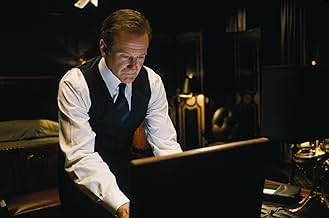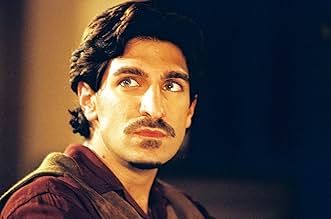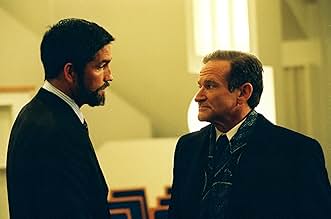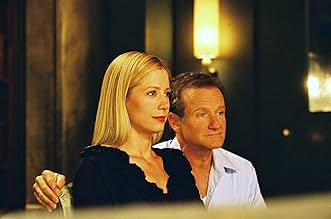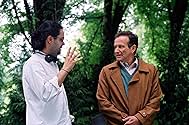CALIFICACIÓN DE IMDb
6.1/10
35 k
TU CALIFICACIÓN
En un mundo donde hay chips que registran la vida de una persona, vive Alan, el mejor editor de películas de que existe. Sin embargo, sufrió un trauma que le llevará a identificar en una pel... Leer todoEn un mundo donde hay chips que registran la vida de una persona, vive Alan, el mejor editor de películas de que existe. Sin embargo, sufrió un trauma que le llevará a identificar en una película a una persona que debería estar muerta.En un mundo donde hay chips que registran la vida de una persona, vive Alan, el mejor editor de películas de que existe. Sin embargo, sufrió un trauma que le llevará a identificar en una película a una persona que debería estar muerta.
- Dirección
- Guionista
- Elenco
- Premios
- 1 premio ganado y 4 nominaciones en total
Tarek Bishara
- Hasan
- (as Thom Bishops)
- Dirección
- Guionista
- Todo el elenco y el equipo
- Producción, taquilla y más en IMDbPro
Opiniones destacadas
The plot is timely and intriguing, providing lots of food for thought as to the perhaps not-too-far future prospects of technology and our own legacies.
I agree the relationship between Williams' character and his love interest was too sketchy. With a few extra minutes expanding on those two, the film might have been more fleshed out. Overall, I enjoyed the movie. It really gave us pause to reflect on the pros and cons of the "Zoe Implant" and "rememories." Appreciated the intense acting abilities of Williams and Caviezel; otherwise, the movie might have lagged even more.
I thought the angles of the camera shots were interesting.
I agree the relationship between Williams' character and his love interest was too sketchy. With a few extra minutes expanding on those two, the film might have been more fleshed out. Overall, I enjoyed the movie. It really gave us pause to reflect on the pros and cons of the "Zoe Implant" and "rememories." Appreciated the intense acting abilities of Williams and Caviezel; otherwise, the movie might have lagged even more.
I thought the angles of the camera shots were interesting.
Set in a world with memory implants, Robin Williams plays a cutter, someone with the power of final edit over people's recorded histories. His latest assignment is one that puts him in danger.
While this is an interesting science fiction universe in and of itself, it also has an interesting message on surveillance and Neo-Luddism. While the idea of having your life on film for future generations may sound pleasant (or horrible), it puts everyone in the path of a camera -- anyone who looks at you may be recording your every move.
This is an idea that is thoughtful and well-presented. Maybe they could have explored the theme more, and it might even be worth returning to this universe in a future film...
While this is an interesting science fiction universe in and of itself, it also has an interesting message on surveillance and Neo-Luddism. While the idea of having your life on film for future generations may sound pleasant (or horrible), it puts everyone in the path of a camera -- anyone who looks at you may be recording your every move.
This is an idea that is thoughtful and well-presented. Maybe they could have explored the theme more, and it might even be worth returning to this universe in a future film...
I really enjoyed Robin Williams performance in this movie. Mira Sorvino was also pretty good. what an interesting idea this movie does present us. what if.... and the end of you're life someone could take out all of the bad things you did or thought about.. and have someone re-arrange all of you're memories to where only the pleasant stuff came to surface,, therefore when people went to you're funeral you would be fondly remembered. well this is the job that is set for our main character to accomplish,, this time he has to make over a nasty lawyer's life,, and there is something that he has seen that he shouldn't have and therefore his life is threatened and his life is now in danger. Robin Williams recently has played a few bad guys, and a few creepy ones.. it's a refreshing turn for me as only ever seen him in comedies.. and his stand-up, and the ever popular Mork and Mindy on TV. this is a dark movie, and very well done,, I will watch it again soon.
It's the kind of film provoking many ethical questions about life, death, privacy and so on. Omar Naim's direction gives a glimpse into possible science discoveries and paths; its strong originality consists of showing how the state of civil rights could be threatened if these futuristic odyssey came true. The whole film is based on a steady premise, very solid performances and an impressive visual style, though special effects are not as special as one could think (given this title and this plot). Robin Williams is now accustomed to playing such frightening and alluring roles; after "Insomnia", "One hour photo" and this flick "Dead Poets Society" is now a far memory.
Set during an unspecified future era, or perhaps an "alternate universe" present era, The Final Cut posits a world in which "first person viewpoint" computer chip implants are possible for those who can afford it. These record a person's entire life from a first person viewpoint--the "camera" sees what the person sees, hears what they hear. The intention is to have an accurate, documentary-like record after the person dies. These are presented as films at their funerals. Citizens known as "cutters" (just a slang for a film editor) pare down one's life to a feature length presentation. There are also those who protest the implants. The Final Cut is the story of the latter days of a cutter, Alan W. Hakman (Robin Williams).
While The Final Cut is enjoyable enough, it has tremendous squandered potential. As one would expect, Williams turns in an incredible performance, but the script, by writer/director Omar Naim, could have used a lot of work.
The premise is fabulous. It opens many philosophical and psychological cans of worms. Some are dealt with, but only cursorily. Surely cutters go through a lot of emotional trauma as they vicariously experience the lows and the mundanities of other person's lives. Naim shows us this briefly with a recording of someone who was an abuser. But as soon as he shows us this material, he drops it. The film is advertised as a thriller. How much more exciting would it have been to embed Hakman in the middle of some grand, suspenseful plot, the details of which became known to him through data from an implant? As one of the opponents of the implant technology remarks, the implants have changed the way people relate to each other. That is a good point--it would have a profound impact on that. So why aren't we shown instances of this in the film? This could have been another hinge for a very intriguing, tense plot.
There are also issues of invasion of privacy, surveillance paranoia, consent (the implants are shown being put into infants and being permanent), and "misuse" of the data. Most of these are barely touched. Often they're only broached with a single comment, or a protester's sign.
Other fascinating issues brought up by the idea of the technology are not even mentioned. Surely, such technology would prove to be invaluable as evidence in crimes. And surely many people, especially victims, would voluntarily offer a "tap" into their implants so they can be witnesses. Why not comment on these kinds of possibilities? The Final Cut is also oddly understated with such a far-reaching sci-fi premise in this era of rubber reality films. A number of plot points, such as the one involving Louis Hunt, have almost disappointingly mundane resolutions. For that matter, for a sci-fi film set in the future or an alternate reality, there isn't much that is different about the world except for the implants. Probably the lack of differences was due to budget. It costs a lot of money to build alternate realities.
This might sound far too negative for the film to warrant a 7 out of 10 from me, which is equivalent to a "C" letter grade. Much of the film is saved by the performances. In combination with direction that is more often than not interesting and unusual, it's easy to focus on the promise of the premise rather than the unfulfilled extensions of the same.
Hakman, and presumably the other cutters, have odd dispositions. Their task is to make everyone look good--like a mortician making up a mangled body so it's "presentable" at a funeral. They spend hour upon hour as voyeurs. They are something like archivists, but also have to play detective. It makes them strangely aloof and dour. It's difficult for them to have relationships. Naim gets in a couple cracks that portray the cutters and their social relationships as similar to geeky "Internet addicts". This is all good stuff, and it's excellently played by Williams.
The flow of the film is a bit odd, and especially the ending (which I praised for its relative nihilism) is eventually abrupt in a way that doesn't exactly work (and I usually love abrupt endings). Being generous, we could take the wonky flow as a "level-removed" kind of self-reference. Of course Naim was faced with cutting the film to make it look good, but it's a bit awkward and arbitrary-feeling, just as a cutter's work would likely be when faced with having to produce a coherent 90-minute film out of 80 years' worth of material. Being less generous, Naim simply needs to learn how to better tell a story, and there was no intention of real-world reflexivity with his fictional material.
The Final Cut is worth seeing, especially if you're a Robin Williams fan as I am, but it's a disappointment considering what it could have been.
While The Final Cut is enjoyable enough, it has tremendous squandered potential. As one would expect, Williams turns in an incredible performance, but the script, by writer/director Omar Naim, could have used a lot of work.
The premise is fabulous. It opens many philosophical and psychological cans of worms. Some are dealt with, but only cursorily. Surely cutters go through a lot of emotional trauma as they vicariously experience the lows and the mundanities of other person's lives. Naim shows us this briefly with a recording of someone who was an abuser. But as soon as he shows us this material, he drops it. The film is advertised as a thriller. How much more exciting would it have been to embed Hakman in the middle of some grand, suspenseful plot, the details of which became known to him through data from an implant? As one of the opponents of the implant technology remarks, the implants have changed the way people relate to each other. That is a good point--it would have a profound impact on that. So why aren't we shown instances of this in the film? This could have been another hinge for a very intriguing, tense plot.
There are also issues of invasion of privacy, surveillance paranoia, consent (the implants are shown being put into infants and being permanent), and "misuse" of the data. Most of these are barely touched. Often they're only broached with a single comment, or a protester's sign.
Other fascinating issues brought up by the idea of the technology are not even mentioned. Surely, such technology would prove to be invaluable as evidence in crimes. And surely many people, especially victims, would voluntarily offer a "tap" into their implants so they can be witnesses. Why not comment on these kinds of possibilities? The Final Cut is also oddly understated with such a far-reaching sci-fi premise in this era of rubber reality films. A number of plot points, such as the one involving Louis Hunt, have almost disappointingly mundane resolutions. For that matter, for a sci-fi film set in the future or an alternate reality, there isn't much that is different about the world except for the implants. Probably the lack of differences was due to budget. It costs a lot of money to build alternate realities.
This might sound far too negative for the film to warrant a 7 out of 10 from me, which is equivalent to a "C" letter grade. Much of the film is saved by the performances. In combination with direction that is more often than not interesting and unusual, it's easy to focus on the promise of the premise rather than the unfulfilled extensions of the same.
Hakman, and presumably the other cutters, have odd dispositions. Their task is to make everyone look good--like a mortician making up a mangled body so it's "presentable" at a funeral. They spend hour upon hour as voyeurs. They are something like archivists, but also have to play detective. It makes them strangely aloof and dour. It's difficult for them to have relationships. Naim gets in a couple cracks that portray the cutters and their social relationships as similar to geeky "Internet addicts". This is all good stuff, and it's excellently played by Williams.
The flow of the film is a bit odd, and especially the ending (which I praised for its relative nihilism) is eventually abrupt in a way that doesn't exactly work (and I usually love abrupt endings). Being generous, we could take the wonky flow as a "level-removed" kind of self-reference. Of course Naim was faced with cutting the film to make it look good, but it's a bit awkward and arbitrary-feeling, just as a cutter's work would likely be when faced with having to produce a coherent 90-minute film out of 80 years' worth of material. Being less generous, Naim simply needs to learn how to better tell a story, and there was no intention of real-world reflexivity with his fictional material.
The Final Cut is worth seeing, especially if you're a Robin Williams fan as I am, but it's a disappointment considering what it could have been.
¿Sabías que…?
- TriviaThe Zoe implant records all visual experiences in a person's life. In Greek, Zoe means "life".
- ErroresThe paper announcing Bannister's death states that he was 54 when he died. But, when Alan loads his implant for the first time, it states that there are 544,628 life hours to review. That number of hours would make him over 62 years of age.
- Bandas sonoras4 Seasons/Spring
(1725)
Written and Composed by Antonio Vivaldi (as Vivaldi)
Performed by Royal Philharmonic Orchestra (as The Royal Philharmonic)
Published by Extreme Music Library PLC
Courtesy of Extreme Production Music
Selecciones populares
Inicia sesión para calificar y agrega a la lista de videos para obtener recomendaciones personalizadas
- How long is The Final Cut?Con tecnología de Alexa
Detalles
- Fecha de lanzamiento
- Países de origen
- Sitio oficial
- Idioma
- También se conoce como
- The Final Cut
- Locaciones de filmación
- Productoras
- Ver más créditos de la compañía en IMDbPro
Taquilla
- Total en EE. UU. y Canadá
- USD 551,281
- Fin de semana de estreno en EE. UU. y Canadá
- USD 226,296
- 17 oct 2004
- Total a nivel mundial
- USD 3,222,439
- Tiempo de ejecución1 hora 35 minutos
- Color
- Mezcla de sonido
- Relación de aspecto
- 2.35 : 1
Contribuir a esta página
Sugiere una edición o agrega el contenido que falta

Principales brechas de datos
By what name was Más allá de la muerte (2004) officially released in India in English?
Responda

